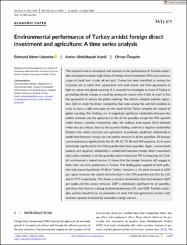| dc.contributor.author | Udemba, Edmund Ntom | |
| dc.contributor.author | Kamil, Anton Abdulbasah | |
| dc.contributor.author | Özaydın, Orhan | |
| dc.date.accessioned | 2023-09-22T09:18:12Z | |
| dc.date.available | 2023-09-22T09:18:12Z | |
| dc.date.issued | 2022 | en_US |
| dc.identifier.issn | 1472-3891 | |
| dc.identifier.issn | 1479-1854 | |
| dc.identifier.uri | https://hdl.handle.net/11363/5626 | |
| dc.description.abstract | This research work is developed with interest on the performance of Turkish sustainable development amidst high inflow of foreign direct investment (FDI) and excessive
usage of fossil fuels (crude oil and gas). Turkey has been identified as among the
countries yet to ratify their agreements with both Kyoto and Paris agreements in
fight to reduce the global warming. It is essential to investigate to know if Turkey is
promoting climate change as could be among the reason why it fails to work in line
the agreement to reduce the global warming. The authors adopted quantile regression (QR) to study the linear relationship that exist among the selected variables in
order to have a valid conclusion on the stand of the Turkey towards the control of
global warming. Our findings are: A negatively significant relationship between the
carbon emission and the agriculture in the all the quantiles except the 90% quantile
which shows a positive relationship. Also, the ordinary least square (OLS) estimate
which acts as a robust check to the quantile findings confirms a negative relationship
between the carbon emission and agriculture. A positively significant relationship is
established between energy use and carbon emission in all the quantiles. EU (energy
use) is statistically significant for the 30, 40, 50, 70, 80 and 90% quantiles. EU is more
statistically significant for the 90% quantile than lower quantiles. Again, a mixed (both
positive and negative) relationship is established between foreign direct investment
and carbon emission in all the quantiles which shows that FDI is impacting the Turkish environment a mixed manner. It shows that the foreign investors still engage in
both clean and dirty production in Turkey. This finding gives support to both pollution halo/haven hypothesis (PHH) in Turkey. However, a 1% point increase in GDP
per capita increases the carbon emission both in the 10% quantiles and OLS by 2.82
and 2.797% respectively. This shows a positive relationship that exist between GDP
per capita and the carbon emission. GDP is statistically significant for all quantiles,
and show that there is a strong relationship between CO2 and GDP. Turkish sustainable policies should focus on promotion of clean FDI and agricultural practice with
economic growth anchored on renewable energy sources. | en_US |
| dc.language.iso | eng | en_US |
| dc.publisher | WILEY, 111 RIVER ST, HOBOKEN 07030-5774, NJ | en_US |
| dc.relation.isversionof | 10.1002/pa.2441 | en_US |
| dc.rights | info:eu-repo/semantics/openAccess | en_US |
| dc.rights | Attribution-NonCommercial-NoDerivs 3.0 United States | * |
| dc.rights.uri | http://creativecommons.org/licenses/by-nc-nd/3.0/us/ | * |
| dc.title | Environmental performance of Turkey amidst foreign direct investment and agriculture: A time series analysis | en_US |
| dc.type | article | en_US |
| dc.relation.ispartof | Journal of Public Affairs | en_US |
| dc.department | İktisadi İdari ve Sosyal Bilimler Fakültesi | en_US |
| dc.authorid | https://orcid.org/0000-0003-4191-0767 | en_US |
| dc.authorid | https://orcid.org/0000-0001-5410-812X | en_US |
| dc.identifier.volume | 22 | en_US |
| dc.identifier.issue | 2 | en_US |
| dc.identifier.startpage | 1 | en_US |
| dc.identifier.endpage | 9 | en_US |
| dc.relation.publicationcategory | Makale - Uluslararası Hakemli Dergi - Kurum Öğretim Elemanı | en_US |
| dc.contributor.institutionauthor | Udemba, Edmund Ntom | |
| dc.contributor.institutionauthor | Kamil, Anton Abdulbasah | |
| dc.contributor.institutionauthor | Özaydın, Orhan | |



















